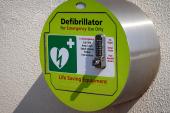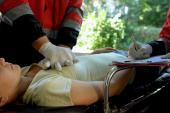New Lancet Commission Takes Aim at Sudden Cardiac Deaths
Population-based research as well as autopsy data are needed to better identify at-risk patients, the multidisciplinary group says.

Identifying people who are most at risk for sudden cardiac death (SCD) and ultimately finding ways to prevent those events remain the biggest challenges in combating this relatively common phenomenon, according to the leader of the new Lancet Commission focused on SCD.
The team kicked off their campaign this weekend at the European Society of Cardiology Congress 2023 with several presentations as well as a simultaneously published paper in the Lancet. The Commission’s goal is to revive 30% of sudden cardiac arrest patients by 2030 and 50% by 2050, according to a press release.
“This is a public health issue,” Eloi Marijon, MD, PhD (European Georges Pompidou Hospital, Paris, France), who’s leading the effort, told TCTMD. “There are 4-5 million sudden deaths every year globally. [Out of those, there are about] 90% of people who would not survive after cardiac arrest.”
Because of these staggering figures, Marijon said now is the time to address the issue of SCD head-on. “We could have done this Commission 10 years ago,” he explained. “But I think now we have more tools to be better in terms of prediction.”
Much has been developed over the last two decades in terms of improving resuscitation, including increased CPR education and availability of automated external defibrillators, both of which have been shown to increase survival, Marijon said. “But we need to acknowledge that the number of sudden deaths occurring every year over the last 20 years is exactly the same.”
Input From More Than 30 Experts
The document, which is authored by more than 30 multidisciplinary experts from around the world, outlines what is known in the field of SCD and what open questions remain.
Primarily, more population-based research is needed to better classify the population at risk for SCD. This can inspire more targeted studies as well as affect policy, the authors argue. Additionally, they call for research “directed towards the development of short-term preventive strategies aiming to prevent SCD within the minutes, hours, and days before the event. Focused studies in large cohorts of recipients of implantable cardioverter defibrillators, with continuous rhythm monitoring from the devices, will provide a unique opportunity to understand the dynamic nature of SCD and any changes of impending arrhythmias.”
We need to acknowledge that the number of sudden deaths occurring every year over the last 20 years is exactly the same. Eloi Marijon
Marijon pointed to genetics as a realm of SCD research that could be particularly helpful. “Using genetics, we could identify the patients, for example, with chest pain at risk of developing cardiac arrest,” he said.
The authors also call for more autopsy data following SCD, especially in that it could help prevent future events in younger individuals who might be at higher familial risk. “Focused research on partial autopsy substitutes, such as postmortem imaging, might better elucidate the value of these methods in identifying arrhythmic SCD,” they write.
Notably, Marijon said that autopsy rates vary drastically by country—ranging from below 5% in France to above 80% in Denmark—so increasing these will take multifactorial and regional approaches. But one current issue is that because these examinations aren’t commonly done in many countries, he said, “we now have nobody able to do good cardiac autopsy.”
Lastly, the Commission says another key objective for the community should also be “understanding the biological, neurological, and psychological foundation of the challenges faced by survivors of sudden cardiac arrest.” This is vital to developing effective rehab programs that serve both survivors as well as family members, they stress.
Yael L. Maxwell is Senior Medical Journalist for TCTMD and Section Editor of TCTMD's Fellows Forum. She served as the inaugural…
Read Full BioSources
Marijon E, Narayanan K, Smith K, et al. The Lancet Commission to reduce the global burden of sudden cardiac death: a call for multidisciplinary action. Lancet. 2023;Epub ahead of print.
Disclosures
- Marijon reports receiving research grants from Abbott, Biotronik, Boston Scientific, Medtronic, MicroPort, and Zoll; consulting fees from Medtronic, Boston Scientific, Zoll, and Abbott; and payment or honoraria for lectures, presentations, speakers bureaus, manuscript writing, or educational events from Medtronic, Boston Scientific, Zoll, and Abbott.





Comments